1. CloutZap Scam (Pay to Click Job Scam)
Do you want to earn money at home? Ever since the pandemic broke out, working remotely has become the norm for many people. Lots of remote job opportunities keep appearing, and it’s getting harder to tell the legitimate ones from the fake.
CloutZap, a website that offers you small pay to click (PTC) tasks to earn extra income, has gone viral via online ads and social media recently. Have you seen this website? (Note: PTC means that you can get paid for clicking on links or sharing posts).

Think twice if you want to join this website. Many people have left negative reviews, saying that they’re unable to withdraw the money they’ve earned and that all the proofs of payment listed on the website are fake. Don’t get scammed!
Here are some red flags:
- The promised income is too-good-to-be-true.
- The website is very young — CloutZap[.]com was registered on October 9th, 2021.
- There are a lot of negative reviews about the website.
- The trust score of CloutZap[.]com is extremely low – only 1 out of 100 (Scamadviser).
- There are always a lot of excuses and “issues” when it comes to withdrawing your earnings.
For more tips on avoiding online job scams, please check out our online job scams survival kit.
You can also use Trend Micro Check to see if a website is secure and browse the web safely: (It’s free!)
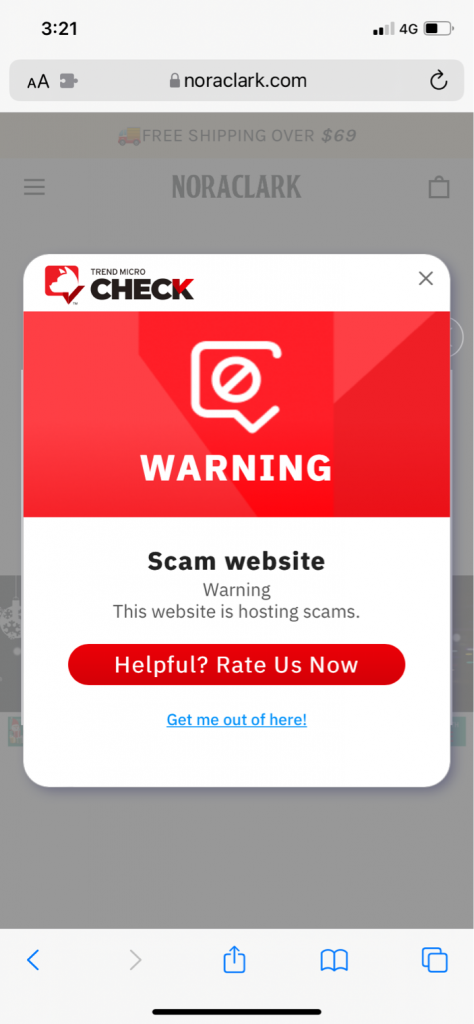
Trend Micro Check is an all-in-one browser extension for detecting scams, phishing attacks, malware, and dangerous links – and it’s FREE!
After you’ve pinned Trend Micro Check, it will block dangerous sites automatically! It is now available on Safari, Google Chrome, and Microsoft Edge.
Check out this page for more information on Trend Micro Check.
2. SMS Phishing
Phishing scams have for a long time been one of the scammer’s favorite tactics to trick you — in which, while impersonating famous brands, they send out fake text messages and emails containing phishing links with the aim of enticing you into opening them with promises of prizes or discounts.
The phishing links lead to online survey pages that state you can claim a gift by completing an online questionnaire. After you fill out the survey, you are prompted to enter personal information, such as credit card numbers, before your “gift” can be delivered. In other instances, the links lead to fake log-in pages that seem to belong to various brands. These pages require you to submit log-in credentials to check a package’s delivery status, change settings, or whatever other task the scammers have asked you to complete.
The scammers’ ultimate goal is to steal your information — they’ll record all the sensitive information you enter on these fake pages and use it to commit cybercrimes: e.g., hack into your bank account, withdraw money, or steal your identity. Don’t let them!
#1 HSBC Bank Phishing
We’ve seen lots of fake bank alert phishing scams before. Posing as HSBC, scammers have been sending out false security alerts, saying that people’s accounts are restricted due to suspicious activities:
- (hsbc alerts 7:28pm est) your account has been restricted due to fraudulent activities. Confirm recent online activities here: <URL>
Then they instruct you to click on the attached link to settle the issue. The link leads to a fake bank login page. Don’t fall for it!

#2 Shipment Tracking Phishing
Last week we reported on package delivery phishing messages, and they are still circulating widely, although now in a new version:
- Shipment Tracking: Hi, your package with tracing number 1EYKTKEL is waiting for you to check the shipment address: <URL>
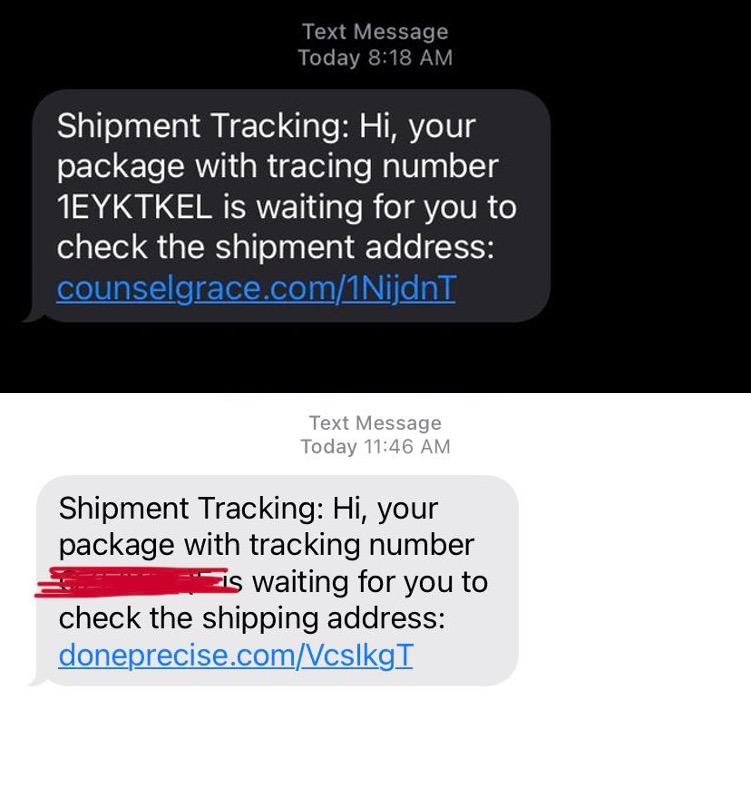
Again, the phishing link leads to a scam website, designed to record your financial credentials – these will all end up in the scammers’ hands!
#3 Verizon Scam
Besides parcel tracking scams, fake Verizon text messages have also been reoccurring this week:
- VZN Free Msg: December bill is paid. Thanks, Here’s a little gift for you: <URL>
The link leads to a Verizon online survey page that promises you a smart health watch if you complete it:
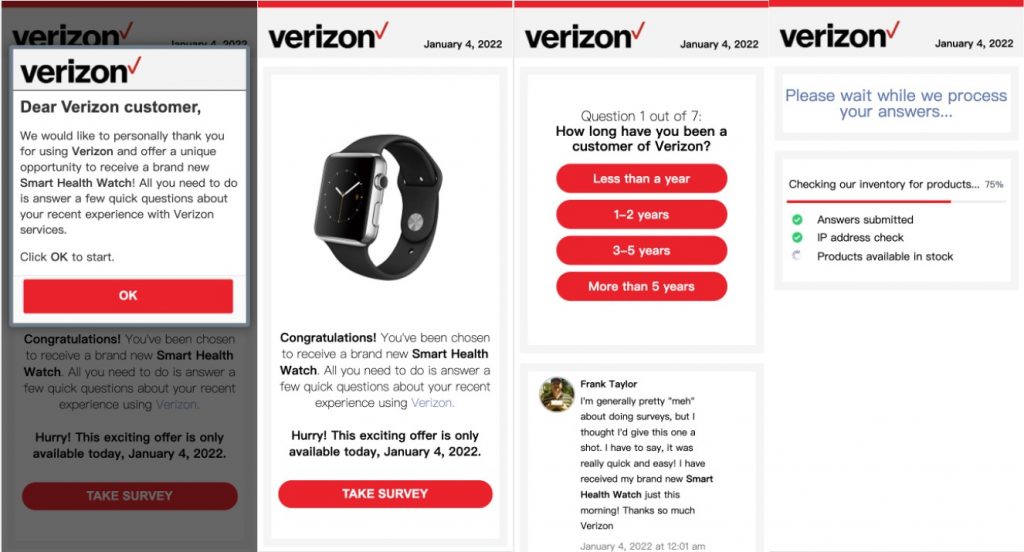
As mentioned above, you will eventually be asked to submit credit card details, but of course, the gift will never appear. Don’t get scammed!
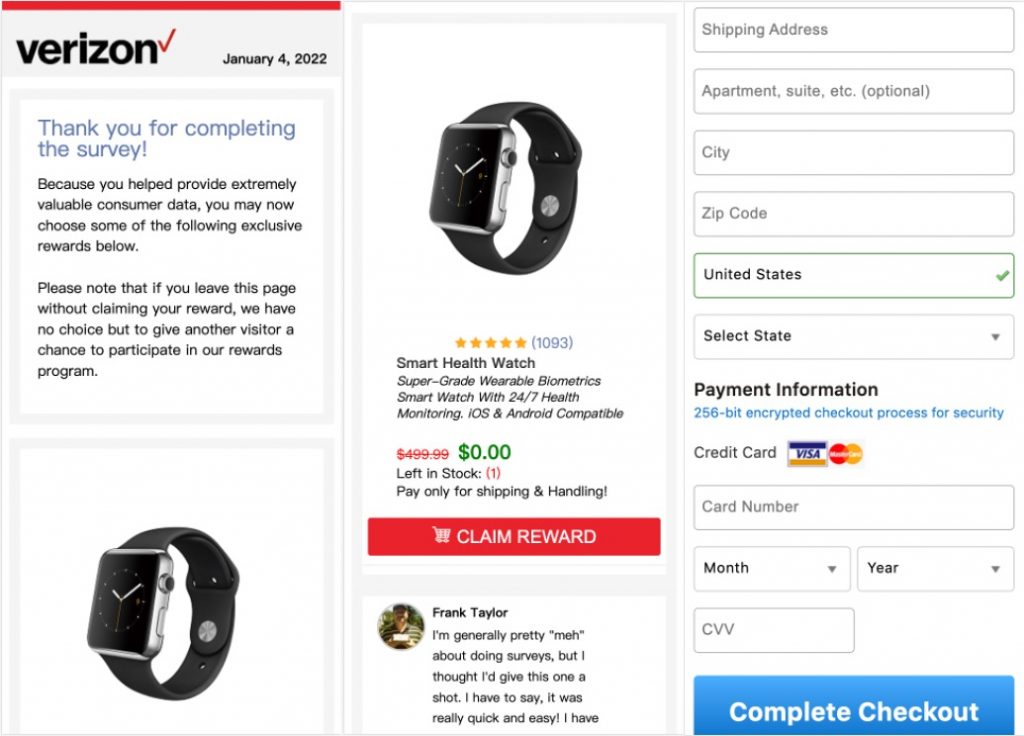
#4 Amazon Gift Card Scam
Who doesn’t love gift cards? But when you receive a text message from an unknown number that guarantees you a $1000 Amazon gift card at no cost, please be careful — it’s too good to be true!
- Well done! A $1000 Amazon giftcard is available for you! <URL>
As with other scams, the link takes you to an online survey page where you could end up exposing your personal information. Watch out!
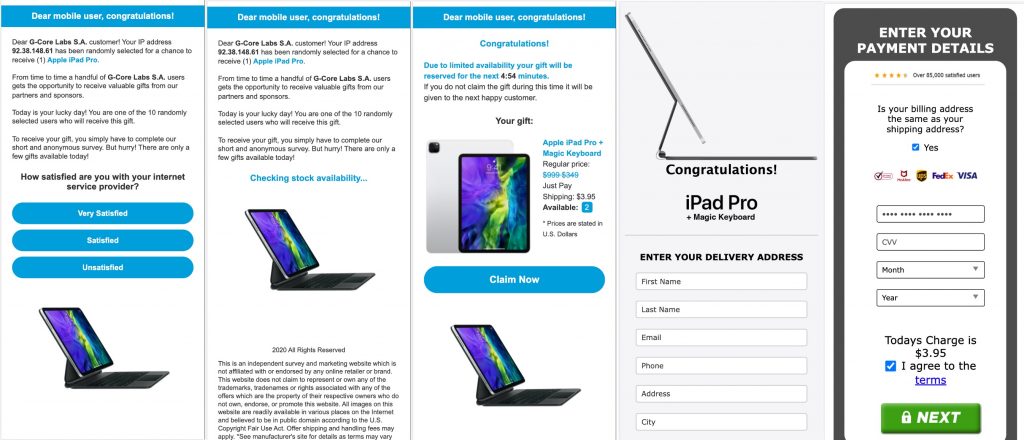
3. Email Phishing
#1 Amazon Christmas Shopper Survey Scam
Although Christmas is over, many are still enjoying the holiday vibe, and so are the scammers! This week we observed a new wave of fake Christmas-themed Amazon survey emails:

Claiming that you can get an exclusive reward, scammers prompt you to click on the embedded button to complete a survey. Then you’ll be taken to a survey page that says you can win a Squid Game tracksuit. Again, this is a phishing page – meaning all the credentials you submit will end up in the scammers’ hands!

#2 MetaMask Phishing Email
If you are using MetaMask to make cryptocurrency investments and transactions, please be extra careful and think twice before you click on any links and enter your password. We’ve recently found many versions of fake MetaMask emails that direct you to fake MetaMask pages, aiming to steal your credentials:
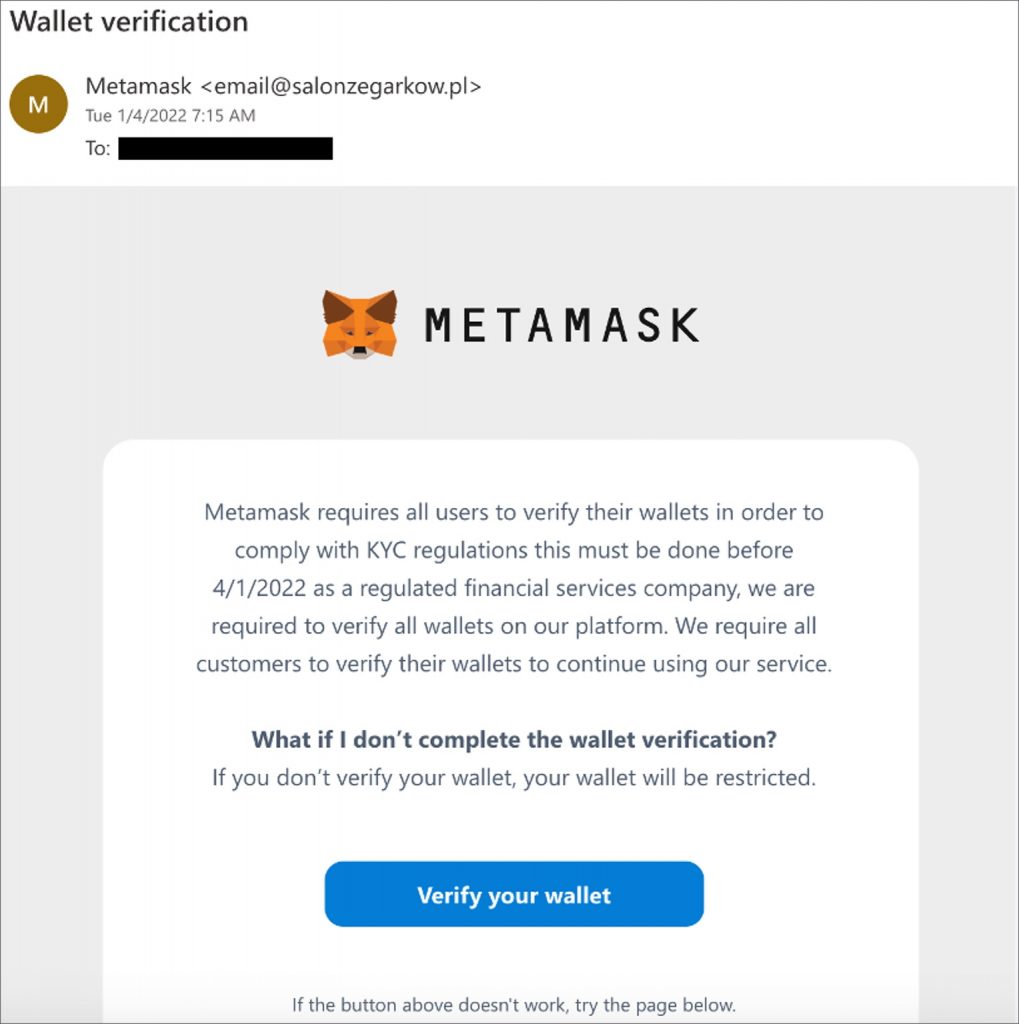
Scammers falsely claim you have to verify your MetaMask wallet due to the Know Your Customer (KYC) regulations. To do that, you are prompted to click on an embedded link in the email to verify your account. The link then takes you to a fake MetaMask website where you are asked to submit your recovery phrase.
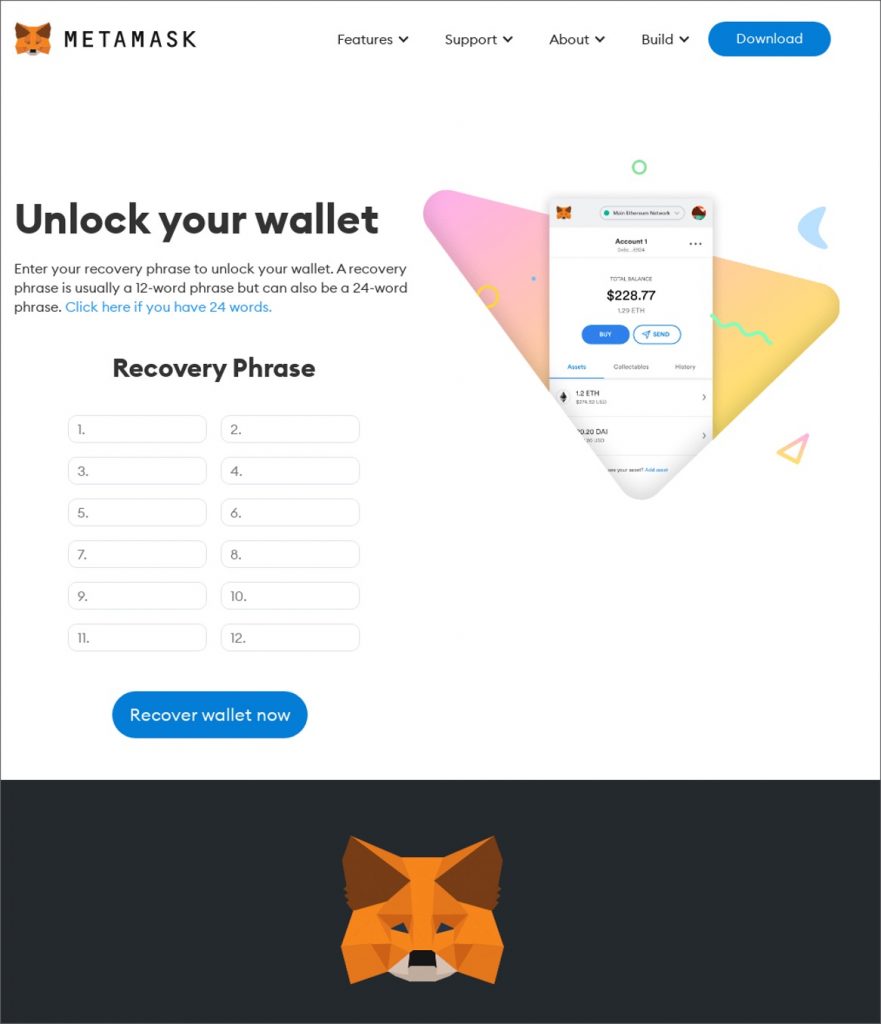
With it, scammers can hack into your MetaMask wallet and transfer every “bit” away. What’s worse, since cryptocurrencies are decentralized, it would be nearly impossible to get your money back! Watch out!
How to Protect Yourself
- Double-check the sender’s mobile number/email address.
- Free gifts or prizes are always a major red flag.
- Always go to the official website/application instead of using links from unknown sources.
- Use Trend Micro Check to surf the web safely (It’s free!)
- Add an extra layer of protection to your device with Trend Micro Maximum Security. Its Web Threat Protection, Ransomware Protection, Anti-phishing, and Anti-spam Protection can help you combat scams and cyberattacks. Click the button below to give it a try:
As ever, if you’ve found this article an interesting and/or helpful read, please do SHARE with friends and family to help keep the online community secure and protected.
